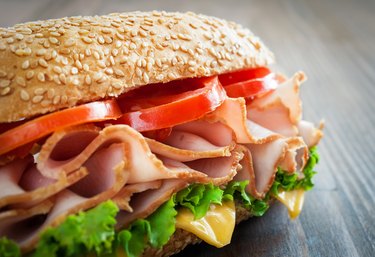
It might be simple and quick to prepare, but you may be wondering how many calories are in a turkey sandwich and if there are ways to make your meal more nutritious and filling.
How you make your turkey sandwich matters. A gourmet version with toppings like bacon, cheese or mayonnaise will have more calories and fat than a turkey sandwich on whole-wheat bread with mustard, lettuce and tomato.
Video of the Day
Video of the Day
Tip
Turkey sandwich calories and nutrition depend on what you make your lunch with. Using toppings like cheese adds some fat, while choosing whole wheat adds more fiber, vitamins and minerals.
Turkey Sandwich Calories and Nutrition
According to the USDA, a turkey sandwich with American cheese, tomato and lettuce on an Italian sub roll will give you:
- Calories: 360
- Total fat: 11 g
- Saturated fat: 6 g
- Trans fat: 0 g
- Cholesterol: 49.9 mg
- Sodium: 1,279.2 mg
- Total carbs: 35 g
- Dietary fiber: 1 g
- Sugar: 2 g
- Protein: 29 g
Turkey Sandwich Calories and Macros
- Calories: You'll get about 360 calories in a turkey sandwich.
- Total fat: A turkey sandwich has 11 grams of total fat, which includes 6 grams of saturated fat and 0 grams of trans fat.
- Carbohydrates: A turkey sandwich has 35 grams of carbs, which includes 1 gram of fiber and 2 grams of sugars.
- Protein: A turkey sandwich has 29 grams of protein.
Vitamins, Minerals and Other Micronutrients
Eating a turkey sandwich will supply some other vitamins and minerals. On top of a good dose of protein, you'll get:
- Vitamin A: 42% Daily Value (DV)
- Calcium: 15% DV
- Iron: 15% DV
Tip
Keep in mind that cured meats, such as deli-style turkey, are often high in sodium. The American Heart Association recommends taking in no more than 1,500 milligrams of sodium per day to reduce the risk of heart disease.
Turkey Sandwich on Whole Wheat Calories and Nutrition Differences
The bread you choose can make a big difference in the nutrients and calories in a turkey sandwich. Per the example above, an Italian sub roll has 210 calories, according to the USDA.
Alternatively, there are only about 161 calories in two slices of whole-wheat bread (check your individual food labels for exact amounts), per the USDA. Eating your turkey sandwich on wheat bread could save you about 50 calories, and it'll add nutrients such as fiber, B vitamins, vitamin E, magnesium and zinc while taking away some of the sodium.
Other Options
Go whole grain: Whole-grain bread is another nutritious option for your turkey sandwich, and yes, it's different than whole wheat. Whole-wheat bread is made strictly from ground wheat, while whole-grain bread is made with other grains such as barley, oats, millet and spelt, according to Johns Hopkins All Children's Hospital.
Even if it adds calories, there are so many whole-grain benefits you'll want to take advantage of. They contain the entirety of the grain, including the bran and the germ, making them rich in fiber and micronutrients. Eating whole grains has been associated with a lower risk of heart disease, cancer and all-cause mortality, according to June 2016 research in BMJ.
Choose low-calorie, nutrient-rich toppings: A turkey sandwich usually includes more than just meat and bread. Spreads like mayonnaise, for example, add up to 100 calories and 11 grams of fat per tablespoon, while the same amount of yellow mustard has just about 10 calories and no fat, per the USDA.
Watery, crisp vegetables such as iceberg or romaine lettuce, cucumbers, bell peppers, pickles and tomatoes are all low in calories and add antioxidants to your meal.
And even if a few slices of avocado make your sandwich a bit more calorie-hefty, it adds great dietary value. Avocados are rich in healthy fat, fiber, potassium, folate and vitamins B6, C and E, according to the Academy of Nutrition and Dietetics.
- BMJ: "Whole Grains and Public Health"
- Academy of Nutrition and Dietetics: "Healthy Fats"
- USDA MyFoodData: Turkey Sandwich
- American Heart Association: Get the Scoop on Sodium
- USDA MyFoodData: Whole Wheat Bread
- USDA MyFoodData: Italian Sub Roll
- Johns Hopkins All Children's Hospital: What's Better: Whole Wheat or Whole Grain?
- USDA MyFoodData: Mayonnaise
- USDA MyFoodData: Yellow Mustard